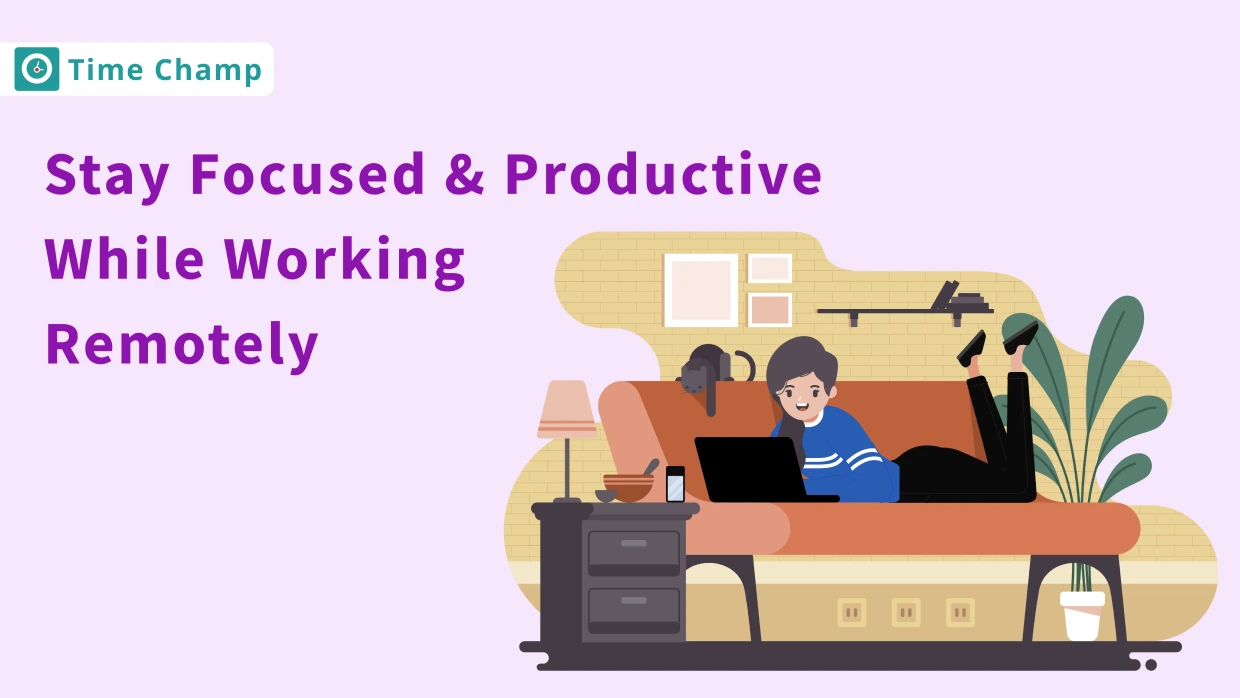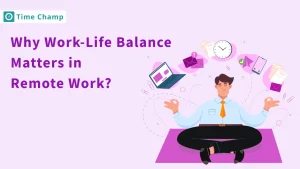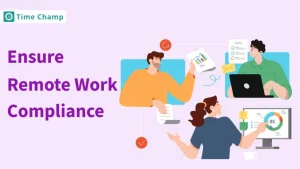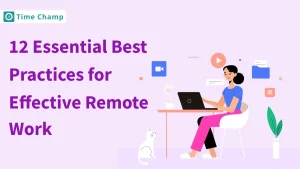While working from home might sound great, staying focused can be a big problem. A lot of things can distract you from the task at hand. These could be the TV, the noise from your family, social media, and household chores. In the blink of an eye, the time will be gone, and the work will still need to be done. This, in turn, can lead to high levels of tension, unmet deadlines, and poor performance.
But don’t worry! Through consistent habits and small adjustments, you can focus on your work even at home. In this blog, you will learn some practical tips to keep yourself on the right path and not let those distractions stop you from being more productive each day. Let’s dive in!
Set Up a Dedicated Workspace
Set aside a particular space in your home for working. You can choose a corner that will be free from any disturbance by your family members or pets. This will assist you in concentrating and getting work done. Good lighting is important. If possible, place your desk near a window to get natural light from the sun. Gazing sunlight is good both for your spirits and your eyes. If that is not possible, get a decent desk lamp to brighten the workspace.
Find a chair that will give you proper back support to keep you from slouching or getting back pains after sitting there for long hours. Your desk should be spacious enough to accommodate your computer and working tools without making you feel cramped. Set up your computer screen at eye level, so you don’t need to bend your neck.
To add a nice touch, personalize your workspace; perhaps decorate it with a picture of your family, a small nursery plant, or some art that you like. You should keep the things you use regularly close to your workspace, including your laptop, notes, and pens, so that you don’t waste time searching for them. Having a proper workspace contributes to better work and relaxation.
Declutter Your Space for Better Focus
A cluttered desk can kill your concentration and productivity. Therefore, spend some time cleaning up your work environment regularly by disposing of items you do not need. Keep the items you use daily in desk drawers or small containers on your desk for easy access. Keep your papers in folders instead of letting them pile up. Try to keep only work-related items on your desk.
The organized environment leads to a clear mind and less stress. Use simple paper trays, boxes, or small shelves to keep small items. Take a few minutes at the end of each workday to tidy your desk, so you will be able to start the work next day without feeling cluttered. A clean workspace helps you stay focused on what you need to do.
Set Clear Goals and Priorities
Be informed on what you want to achieve each day and in the long run. This keeps you focused and makes you more productive. In terms of project management, divide larger projects into smaller, and manageable tasks. Set deadlines for each task so that you can ensure the timely completion of work without facing last-minute panic. This makes it easier to keep your focus and work on any uncompleted tasks with an excellent plan.
Prioritize your most important duty first. Consider what needs immediate attention and what can be pushed aside for later. Note down a simple to-do list on a piece of paper or use project management software like Time Champ that will help you track your tasks. You can cross off tasks when completed. That will show you how much you have accomplished and how much you still have to do. This way, you know exactly what you need to focus on and can get right to work.
Create a Work Schedule
Schedule your regular working hours according to when you feel most ready for work, that is when you will start physically working until the time you call it quits for the day. Maintaining this routine will help to set boundaries between work and home life. Plan your tasks for that day so they have sufficient time scheduled for completion.
Allocate specific times for meetings, focused work, and desk tasks to maximize productivity. Taking small breaks is equally important while working hard. When you give your mind a rest for a few minutes between tasks, you feel fresh and do not tire out. For example, working for 25 minutes and taking a 5-minute break is a good way to stay focused and accomplish more things.
A regular schedule improves the workflow. You know what to expect and when to do each task. This makes things easier on the workday and increases productivity without rushing too much. A basic plan rounds off your day by keeping you on track and allowing you to handle unexpected tasks.
Minimize Distractions
To get more work done, you need to eliminate distractions. Think of the things that usually get your attention such as checking your social media, doing house tasks, or the noise around you. Turn off your phone alerts and notifications and do the same with your computer during work hours.
Speak with your family and let them know that you require a quiet time to work. You can get rid of annoying noise in many ways. You can use noise-cancellation headphones or play some quiet music for better concentration. Some people prefer listening to white noise, such as the sound of rain or a fan, to help improve focus.
Stay Connected and Accountable
Since working from home can be lonely, be sure to talk to your team. Work together and continue to feel part of the group via video calls, quick messages, or emails. Regular meetings ought to be scheduled to discuss progress, provide support, and solve issues. This helps one remain accountable, while also allowing for a sense of working together in an office environment.
Being answerable to someone helps you focus more and complete more work. Find a mentor or accountability partner to help you set goals and track your progress. Engaging in workgroups or team meetings can provide you with support and the knowledge that comes from others. Talking to others about your work will help you stay aware and connected to your team.
Take Breaks and Move Around
When working remotely, take breaks and move around to stay flexible. Staying too long at the desk makes one’s body stiff and tiresome, and it becomes harder to perform well. A little stretch, a short walk around the house, or some simple exercises with breaks in between can make all the difference. Even spending a few minutes outside to get fresh air may clear your mind and lessen stress.
Exercise stimulates the brain. When you are physically active, you pump blood to your brain, helping you think clearly and maintain some focus. Try to work for 25 minutes and then take a small break. This prevents any major fatigue from setting in and helps to keep your energy levels up throughout the day. Setting some time to move around during your workday increases your productivity and well-being.
Maintain Work-Life Balance
Keep a clear separation between your work and life. Excess of work leads to tiredness and stress. Create a reasonable timetable and stick to it. Set specific work hours, and stay within those hours. Avoid checking work emails or attending to work tasks once work hours are over. This way, you can enjoy your free time.
It would be best if you set aside a special location for your work, as far from where you relax as possible. This will make it easier for you to leave work behind at the end of the day. Whenever you step out of your working space, there should be a signal in your mind instructing you to switch off. For your mind to feel refreshed and not burdened by work fatigue, engage in hobbies, exercise, and spend time with family and friends.
Track Your Time & Productivity Effectively Using Time Champ
Working at home has many challenges especially in managing time and being productive. Time Champ is the employee time and productivity tracking software that enables you to track work hours and measure your productivity to remain focused and finish tasks quickly.
Time Champ helps with tracking your working hours effectively and accurately. You do not have to log your time manually. Time Champ automatically records the time you spend on the tasks. Thus, it offers a transparent look into how much time you spend on each task. You can also track time spent on specific projects, thus helping you meet deadlines and figure out where your time goes.
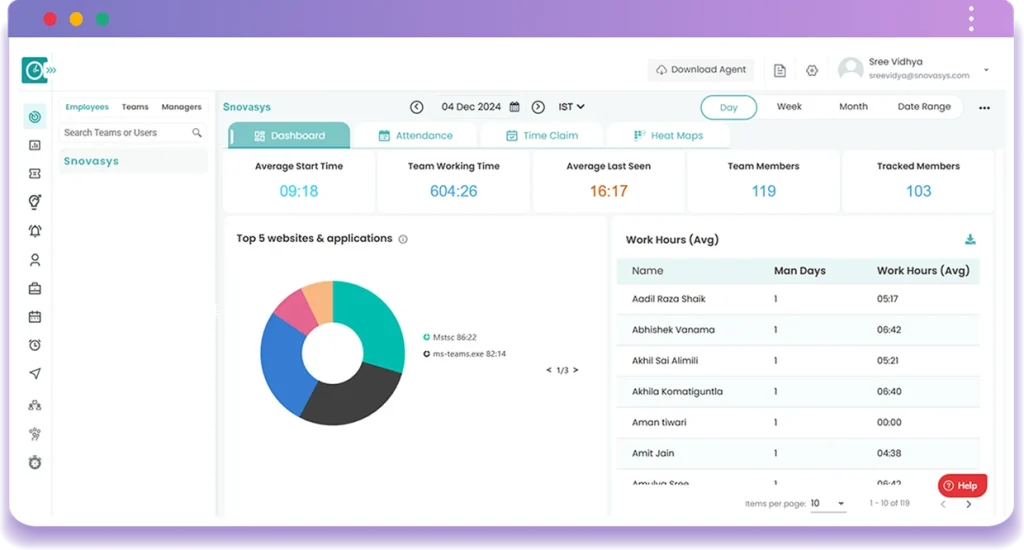
Additionally, Time Champ detects idle time and breaks so that you can know when you are working and when you are taking time off. This way, you can plan your day better and ensure you are utilizing your time wisely. Time Champ generates comprehensive reports on working hours. This permits you to rearrange your scheduling for a more productive approach so that you won’t waste any time.
Time Champ keeps track of work hours as well as measures productivity in terms of productive hours, unproductive hours, and neutral hours while providing productivity reports. Time Champ keeps track of the apps and websites you use so that you can figure out which activities keep you productive and which ones distract you from work. This way, you can limit time spent on unnecessary tasks and focus more on those things that truly matter.
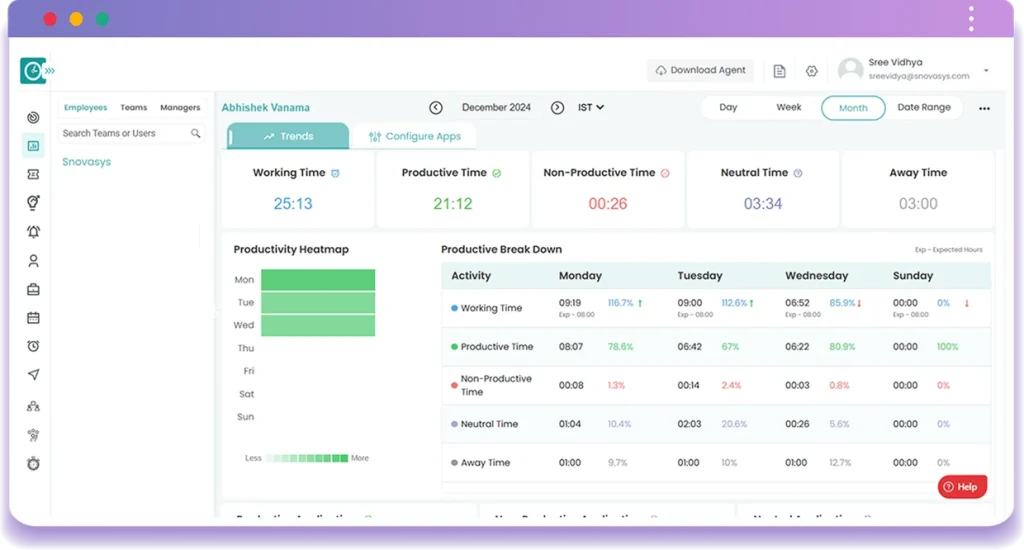
Conclusion
It’s possible to stay focused while working from home with the right techniques. A dedicated workspace, a structured schedule, and smart productivity tricks can keep you on track. Being organized, avoiding distractions, and balancing work and personal life will help keep you productive. Therefore, implement these measures for an uninterrupted, stress-free remote work setting that sustains focus and success.
Frequently Asked Questions
Social media can be a major distraction when working from home. You can use website blockers like Cold Turkey or Freedom to limit access during work hours. Keeping your phone in another room and setting specific times for social media breaks can also help.
Clear communication is key. Let your family or roommates know your work schedule and set boundaries. Using noise-canceling headphones and working in a quiet space can also minimize disturbances. Creating a visual signal, like a closed door or a “Do Not Disturb” sign, can indicate when you’re focused on work.
Burnout happens when you overwork without taking enough breaks. To avoid it, schedule regular breaks, maintain a work-life balance, and set clear work hours. Engaging in activities like exercise, meditation, or hobbies outside of work helps recharge your energy.
Isolation is common in remote work, but staying connected with colleagues can help. Schedule virtual check-ins, participate in online team chats, and join professional groups to interact with others. Working from a co-working space or a café occasionally can also provide a change of environment.
Tracking your work progress helps you stay accountable. Tools like Time Champ can monitor how much time you spend on tasks, while productivity journals or to-do lists can help track daily accomplishments. Reviewing your goals at the end of the day ensures you stay on track.
